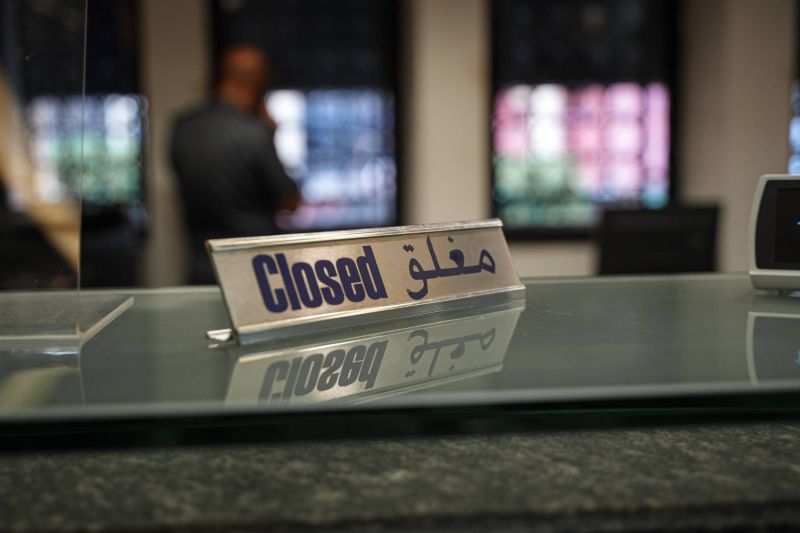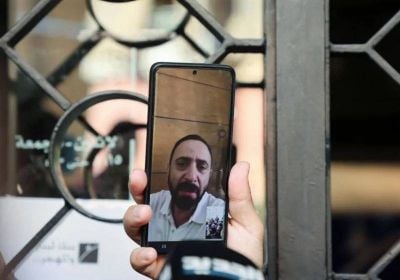
The Association of Banks announced a week-long closure of bank branches in September, following a string of holdups by angry depositors. (Credit: Mohammad Yassine/L'Orient Today)
BEIRUT — Lebanon is experiencing a spate of holdups by depositors demanding access to their own funds.
These depositors risk incurring lawsuits from banks and public prosecutors, but there is another, lesser known tactic that could be used against them: personal lawsuits filed by bank employees.
At least one man, Abdallah al-Saii, currently faces two such lawsuits from employees of the Bank of Beirut and Arab Countries (BBAC) branch in Jeb Jenin, a town in the Bekaa Valley.
In January, Saii allegedly entered the BBAC branch in the Bekaa town carrying gasoline and grenades, according to media reports, in an attempt to forcibly withdraw his blocked savings. In February, he was released on a LL200,000 bail after two weeks in jail.
In Lebanon, the state prosecutes defendants through what is known as a public right lawsuit. But personal parties — including companies, such as banks — can also launch criminal proceedings, known as personal right lawsuits, if they believe they have suffered emotional distress, injury, or financial damages.
Saii faced public prosecution for the bank incident, but two of the employees of the Jeb Jenin BBAC branch also filed personal right lawsuits against him, according to lawyers for Saii and BBAC. Personal right lawsuits highlight a relatively unpublicized legal risk for the roughly dozen people who used bank holdups to forcibly withdraw money that was stuck in their accounts for nearly three years, and for those who may follow in their footsteps.
According to Saii’s lawyer, Fouad Debs of the Depositors Union advocacy group, his is the only case — so far — where employees have launched personal lawsuits against a depositor who allegedly committed a bank holdup.
Debs said the bases for the personal charges against Saii are “use of weapons,” “threats,” and “deprivation of freedom.” The first two are misdemeanors while the third is a felony, but all carry potential jail time.
Debs also said Saii is facing a personal lawsuit filed by BBAC, but the bank’s lawyer, Ramzi Haykal, denies this.
“We did not file a personal right lawsuit as a bank [even though] we have the right to file one until a deadline of three years has passed,” Haykal told L’Orient Today.
“We felt we didn’t want to clash with our depositors because we protect them as a bank and it’s important to us that they get their money within a framework of solutions provided by the state, which is in large part responsible, along with Banque du Liban, for the losses of people’s deposits,” Haykal added. “And we have a responsibility that we must bear.”
Haykal did not respond to questions about the discrepancy between his and Debs’ statements regarding a BBAC lawsuit against Saii.
Could more bank employees turn to personal lawsuits?
Potential legal consequences for depositors who take their money by force remains unclear.
Judicial authorities have set small bails and granted fairly quick releases to suspects, including a LL1 million bail set earlier Thursday for the release of Sali Hafez, who allegedly held up a Blom Bank in Beirut in September using a toy gun.
Banks have been hesitant to press their cases in court. Blom Bank dropped its charges against Hafez Thursday, just as Federal Bank dropped charges against depositor Bassam al-Sheikh Hussein in August.
Hafez’s lawyer, Ali Abbas, previously told L’Orient-Le Jour that the withdrawal of personal lawsuits filed by banks would “considerably” reduce the penalties handed down in the public prosecution.
Employee-driven lawsuits, however, are relatively unexplored territory. Debs thinks it’s likely that more lawsuits could turn up as bank employees’ representatives express frustration over the holdups. He pointed to a recent strike action by the Federation of Bank Employees' Unions over the issue of bank security.
Debs said Saii’s low bail indicates the verdict in his public prosecution case will be favorable. Saii could walk away with a misdemeanor for claiming justice with his own hands, rather than pursuing legal channels, Debs said.
”Because they released him, he considers himself victorious,” said BBAC lawyer Haykal. “But, in my opinion, he has not won because, in the end, there must be a judgment on him as the law must be applied to everyone … or else everyone would do the same thing.”
As for bank employees, Debs alleges that the bank pushed them to file suit. He also said the bank “pressured them to keep the lawsuits so they can keep the pressure on Abdallah [al-Saii].”
BBAC did not respond to a request for comment, but Haykal said “the employees who were frightened [during the holdup] filed personal lawsuits themselves,” adding that he is not their lawyer.
Haykal noted that the statute of limitations in such a case is three years.
In the meantime, Saii is not backing down. He said he is not worried about the legal outcome of the cases in court because he “didn’t do anything wrong.”
“I entered [and] took my money, as is my right legally,” Saii said. “I didn’t rob anyone, I didn’t hurt anyone, I didn’t even hurt the bank.”
He maintains he was kind to the bank employees during the holdup and was clear he had no personal problem with them. So it was a surprise, Saii said, when he went to the courthouse and was told there were two personal lawsuits pending against him.
Saii said the two employees came to a hearing and refused to withdraw their lawsuits, to which he replied that it made no difference to him.
“They can’t do anything to me because I’m not in the wrong. If they want to do something to me it’s of no concern to me. Don’t think I’m worried.”
